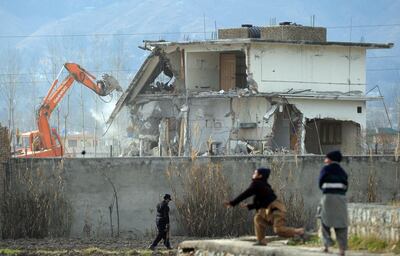A decade ago, then US president Barack Obama stood in front of a White House lectern to deliver arguably the most symbolic victory of his presidency. A small team of Navy Seals had killed Al Qaeda's leader, Osama bin Laden, who was hiding in Pakistan. Speaking to the 56 million Americans who tuned into the address, and millions more in watching from abroad, Mr Obama said the assassination was the moment that justice was won for bin Laden's many victims.
Ten years of painful work was wrapped up in this singular success. But the victory, in retrospect, was incomplete: the battle against Al Qaeda as an organisation and the wider fight against terrorism were going nowhere.
Today, bin Laden's organisation is a weaker version of what it once was. The group still maintains a foothold in Pakistan where its current leader, Ayman Al Zawahiri, is thought to be based, although whether or not he is still alive remains a matter of debate. In 2019, Hamza bin Laden, Osama's son and a strong candidate to succeed him, was killed. And Al Qaeda now competes with a new generation of militants. Gone are the days when bin Laden was the figurehead of Islamist terrorism. Today, groups such as ISIS, Al Shabab and Boko Haram compete for global attention.

But Al Qaeda is still a threat. Various offshoots are reported around the world, many of which flourish in the struggling states of the Middle East. In Yemen, Al Qaeda has recently claimed a spate of attacks. After President Biden's decision to withdraw American troops from Afghanistan, many fear that the group could see a resurgence there. At ongoing peace talks overseen by the US, the Taliban claims it will not shelter Al Qaeda again. But with Washington's apparent desire to leave the country as quickly as it can and the Taliban's record for breaking promises, it is entirely possible that, 20 years after the US campaign to rid the country of the group, Al Qaeda could establish a permanent foothold there. America's generals admit that Afghanistan could be plunged into civil war civil war after the withdrawal, and the vacuum created in such circumstances would give Al Qaeda ample opportunity.
As Mr Obama said a decade ago, individual victories do not change the fact that rooting out terrorism and its causes is far harder. Years on, doing so remains a noble objective of the many countries around the world that stand against militancy. At a major speech last Friday, US Defence Secretary Lloyd Austin called for a "new vision" for his country's defence strategy, one that integrates America's military power alongside diplomacy. Mr Austin spent more than 40 years in his country's army. In his address, he noted that most of the past two decades saw him serve in "the last of the old wars". Twenty years on from 9/11, he needs to bring a new fight to terrorists, if past conflicts are to mean anything.






